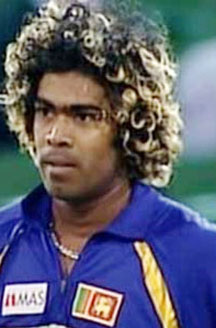MUMBAI, (Reuters) – A battle for supremacy between bouncers and yorkers may eventually decide the outcome of tomorrow’s World Cup Group A showdown between Australia and Sri Lanka in Colombo.

On spin-friendly conditions in Sri Lanka, it might sound surprising that pace will rule but going by current form and team composition, it may well turn out to be so in a re-run of the 2007 final won by Australia.
The champions, chasing their fifth World Cup title overall, have not tried to mask their intentions and have unleashed their pace battery of Brett Lee, Mitchell Johnson and Shaun Tait on opposition batsmen.
The pace trio have used the short-pitched delivery with precise direction and a lot of fire, hitting many a batsman on the body and the helmet thus gaining the mental edge.
In both their matches, against Zimbabwe and New Zealand, the pacemen removed the sting in the opposition batting early and ensured that there was no chance of a late fightback either.
The early strikes from the faster men have allowed the Australian slow bowlers to breathe easy in the tournament so far.
The Australian spinners have bagged just four wickets in the two matches and have got away with that due to the red hot form of their faster counterparts.
MORE BALANCED
Co-hosts Sri Lanka, on paper, have a more balanced attack with some smart spin bowling from Muttiah Muralitharan and Ajantha Mendis, if he plays, backing up pacemen Lasith Malinga and Nuwan Kulasekara.
But it will be Malinga’s slinging toe-crushers that Australia will be wary off.
The colourful fast bowler missed the first two matches of the World Cup due to a sore back, against Canada and Pakistan, and came back sizzling against outclassed Kenya grabbing six wickets, including a hat-trick.
Malinga has a great knack of churning out inswinging yorkers at will and he has made a habit of taking wickets in bunches.

While Sri Lanka will look to the wily Muralitharan to make life difficult for the batsmen during the middle overs, captain Kumar Sangakkara will use Malinga mostly during the powerplays to inflict crucial blows.
The Sri Lankan batting will once again rely heavily on the experienced Sangakkara and Mahela Jayawardene for stability and they will have to ensure that the lower middle order is not exposed too soon to the new ball.
Talk about Australia not being at the top of their game did not matter and they are still the team everyone wants to beat, Muralitharan felt.
“They are the number one and they have won three World Cups in a row,” Muralitharan said.
“So it’s (still) a team to beat. Everyone wants to beat them. We are anxious to beat them too but we will try to treat it as a normal game.”
Given the sides’ bowling prowess, both teams would have to bat really well to post a score in excess of 300, which has almost become a norm on the Indian grounds.
“If you really bat well, you can pass 300,” Muralitharan said.
“But in Indian conditions … with smaller grounds, faster outfields and better batting wickets 350 is achievable. In Sri Lankan conditions 280-290 is a good score.”




